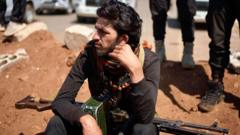The recent violence in Sweida Province has sparked deep concerns over potential sectarian conflict, as the Syrian government announced the evacuation of hundreds of Bedouin families from the region. This decision comes on the heels of over a week of deadly clashes involving armed groups from the Bedouin tribes and the local Druze community, which led to more than 1,100 fatalities, according to the Syrian Observatory for Human Rights.
On Monday, following the cease-fire agreement, the Syrian government deployed security forces throughout Sweida to stabilize the area and safeguard civilians. The clashes, which erupted earlier this month, have brought fears of widespread sectarian violence and have had ramifications beyond Syria's borders, prompting airstrikes from neighboring Israel aimed at protecting the Druze.
President Ahmed al-Shara termed the recent unrest a “dangerous turning point” for Syria, attributing part of the volatility to Israeli intervention. A cease-fire was initially declared on Wednesday but was followed by continued skirmishes, necessitating a firmer governmental response.
As the evacuation commenced, Bedouin families were seen leaving the provincial capital in private vehicles and government buses, even though sporadic fighting persisted. Brigadier General Ahmad al-Dalati, a commander in the interior security forces, affirmed the government's commitment to facilitate the safe exit of those wishing to depart Sweida.
The government has characterized the movement of Bedouin families as a measure for their protection, citing that many had become hostages during the upheaval. An Interior Ministry spokesperson explained that long-standing tensions between the Druze and Bedouin tribes regarding land rights have contributed to the violence in the area.
The situation remains fraught, underscoring the fragile nature of peace in Syria as sectarian divisions resurface in a country still reeling from years of civil war.
On Monday, following the cease-fire agreement, the Syrian government deployed security forces throughout Sweida to stabilize the area and safeguard civilians. The clashes, which erupted earlier this month, have brought fears of widespread sectarian violence and have had ramifications beyond Syria's borders, prompting airstrikes from neighboring Israel aimed at protecting the Druze.
President Ahmed al-Shara termed the recent unrest a “dangerous turning point” for Syria, attributing part of the volatility to Israeli intervention. A cease-fire was initially declared on Wednesday but was followed by continued skirmishes, necessitating a firmer governmental response.
As the evacuation commenced, Bedouin families were seen leaving the provincial capital in private vehicles and government buses, even though sporadic fighting persisted. Brigadier General Ahmad al-Dalati, a commander in the interior security forces, affirmed the government's commitment to facilitate the safe exit of those wishing to depart Sweida.
The government has characterized the movement of Bedouin families as a measure for their protection, citing that many had become hostages during the upheaval. An Interior Ministry spokesperson explained that long-standing tensions between the Druze and Bedouin tribes regarding land rights have contributed to the violence in the area.
The situation remains fraught, underscoring the fragile nature of peace in Syria as sectarian divisions resurface in a country still reeling from years of civil war.

















